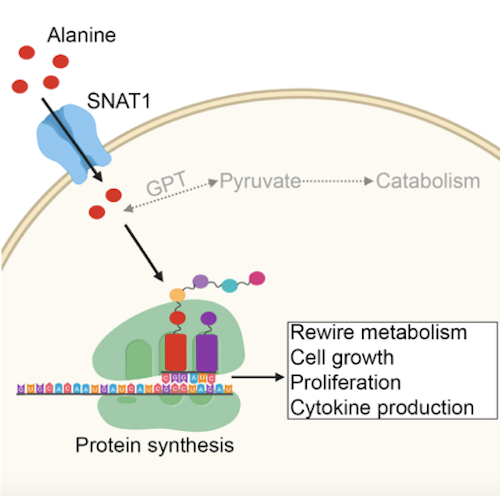 In order to properly respond to invading pathogens, T cells transition from a state of quiescence to a state of activation. This transition is metabolically challenging and to support their growth and functional demands, T cells rely on environmental nutrients. In their recent study published in Cell Reports, the Haigis Lab (in collaboration with the labs of Arlene Sharpe and Josh Rabinowitz) identified extracellular alanine as one of the extracellular nutrients required to support T cell activation. Although alanine is a non-essential amino acid, meaning that it can be synthesized inside the cell via transaminase activity, T cells uniquely rely on the extracellular alanine pool due to low alanine aminotransferase expression. By performing stable isotope tracing, the lab showed that alanine is not catabolized inside the cell but is instead directly shunted into protein synthesis.
In order to properly respond to invading pathogens, T cells transition from a state of quiescence to a state of activation. This transition is metabolically challenging and to support their growth and functional demands, T cells rely on environmental nutrients. In their recent study published in Cell Reports, the Haigis Lab (in collaboration with the labs of Arlene Sharpe and Josh Rabinowitz) identified extracellular alanine as one of the extracellular nutrients required to support T cell activation. Although alanine is a non-essential amino acid, meaning that it can be synthesized inside the cell via transaminase activity, T cells uniquely rely on the extracellular alanine pool due to low alanine aminotransferase expression. By performing stable isotope tracing, the lab showed that alanine is not catabolized inside the cell but is instead directly shunted into protein synthesis.